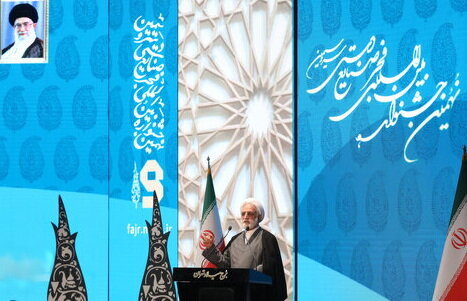Judiciary chief pledges legal support for foreign travelers

TEHRAN - Iran’s Judiciary Chief, Gholamhossein Mohseni-Ejei, has reaffirmed the country’s commitment to addressing the legal concerns of foreign tourists during the closing ceremony of the 9th International Fajr Handicrafts Festival, also known as Sarv-e Simin.
The event, held at Tehran’s Milad Tower on Monday evening, showcased an essence of the country’s rich intangible cultural heritage and the significance of handicrafts in the nation’s economy.
Mohseni-Ejei also emphasized the crucial role of cultural heritage and handicrafts in strengthening Iran’s civilization, noting that government officials must focus on listening to the concerns of society. “As officials, we need to listen more than we speak. Understanding the challenges and potential of our people allows us to better fulfill our responsibilities,” he stated.
Highlighting the significant role of women in Iran’s cultural and economic landscape, Mohseni-Ejei acknowledged the contributions of Iranian women and called for greater recognition of their talents and capabilities.
Elsewhere in his remarks, the judiciary chief underscored the importance of promoting Iran’s cultural and historical legacy to both domestic and international audiences. He urged increased efforts to safeguard the country’s one million cultural and historical artifacts and ensure that future generations take pride in their heritage. “We must work tirelessly to preserve and introduce our nation’s rich cultural and civilizational assets to the world,” he stressed.
Acknowledging tourism as a vital sector for economic growth, Mohseni-Ejei highlighted its role in generating revenue and creating sustainable employment opportunities. “Tourism plays a crucial role in strengthening our economy and increasing foreign exchange reserves,” he said, while stressing the need to balance tourism development with the preservation of Iran’s cultural and religious values.
He further stated that the expansion of tourism and handicraft industries could significantly reduce social challenges by fostering employment opportunities. “A thriving tourism and handicrafts sector not only boosts the economy but also contributes to social stability,” he added.
Talking about anti-Iran propaganda spread by some Western media coverage, Mohseni-Ejei pointed out that Iran’s tourism industry could serve as an effective tool in countering negative global narratives. “The more foreign tourists visit Iran, the more we can counter anti-Iran propaganda and Iranophobia,” he asserted.
He also highlighted the Judiciary’s role in supporting the tourism industry, pledging to work alongside the Ministry of Cultural Heritage, Tourism, and Handicrafts to remove legal barriers and facilitate a better experience for tourists. “We stand ready to collaborate in overcoming legal challenges faced by the tourism sector and ensuring stronger protections for Iran’s cultural heritage.”
Addressing the legal challenges that foreign tourists might face in Iran, he assured that the Judiciary is prepared to assist in resolving such matters. “A foreign tourist entering our country may not be familiar with Iranian laws and social norms. We are prepared to work with the relevant ministry to address their legal concerns,” he stated.
In addition, he stressed the importance of educating visitors about Iran’s legal framework to prevent misunderstandings and ensure a smoother experience. He also expressed the Judiciary’s commitment to enhancing security measures for foreign visitors.
The 9th International Fajr Handicrafts Festival brought together artisans, cultural figures, and officials to celebrate Iran’s handicrafts industry and its role in the country’s cultural and economic development.
AM
Leave a Comment